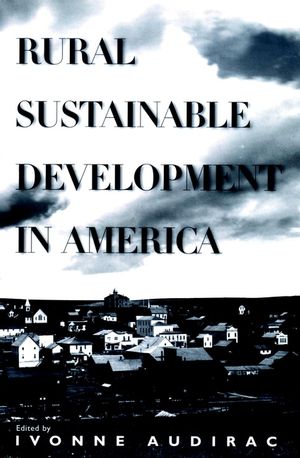Rural Sustainable Development in AmericaISBN: 978-0-471-15233-0
Hardcover
448 pages
April 1997
 This is a Print-on-Demand title. It will be printed specifically to fill your order. Please allow an additional 10-15 days delivery time. The book is not returnable.
|
||||||
A wide-ranging exploration of the issues shaping development inrural North America for the years ahead
This unique volume presents guidelines for dealing with theproblems of development in rural areas, with coverage thatencompasses theory, strategic planning and policy implementation,and practical experience. It contains an in-depth examination ofthe problems faced by rural American towns, communities, andfamilies, and it explores a range of innovative solutions based onthe concepts of sustainable use of indigenous talents andresources.
Contributions by leading experts and seasoned practitionersrepresent a broad spectrum of experience and ideological outlook,making Rural Sustainable Development in America must reading foranyone involved in community development; rural geography,planning, and economic development; public administration;agricultural economics; and public policy. The book covers:
* Historical, philosophical, and ecological foundations ofsustainable development in the rural context.
* Principles of a rural sustainable future in which developmentpolicies embrace holistic and interactive views of ethics, ecology,economics, and sociopolitical systems.
* Different approaches to policy and planning strategy at theregional and local level.
* The role of citizen involvement and empowerment in choosing andeffecting change in community life.
* Real-world experiences with alternative rural-urban symbioses inagriculture, waste management, greenways, and trails.
* Analysis of specific community-based efforts at regionalrevitalization in Indiana, Central Appalachia, and EasternCanada.
The development of an energy and technology intensive, globalagricultural production system over the last few decades has had adevastating impact on traditional rural communities--from thedecline of family farms to the virtual depopulation of small townson a wide scale. But across this bleak landscape, many communitiesare planning and taking action to assure their development insustainable ways.
What are the visions, assumptions, and practical considerationsguiding these efforts? How can communities address the obstaclesthey face in designing and implementing policies that will fosterand support regeneration?
Providing invaluable insight into these questions, RuralSustainable Development in America offers a multidimensional lookat theory, strategic planning, and real-world experience thatprovides planners and others with important tools to use incultivating a sustainable future for rural America.
Contributions by leading experts from a range of disciplines firstexplore the philosophical and ecological underpinnings ofsustainable development within a global and local context. Thesecond part of the book examines regional and local planning andpolicy issues, and the final section assesses the success orfailure of alternative rural-urban symbioses in agriculture, wastemanagement, greenways and trails, and regionalrevitalization.
Encompassing several shades of "greenness," this thought-provokingvolume truly reflects the diversity of views and approaches thatare driving the theory and practice of rural development into thetwenty-first century. It is a vital addition to the literature thatwill inform readers of every ideological orientation andprofessional perspective--in such areas as rural geography,planning, policy, and economic development; agricultural economics;landscape architecture; and public administration.
This unique volume presents guidelines for dealing with theproblems of development in rural areas, with coverage thatencompasses theory, strategic planning and policy implementation,and practical experience. It contains an in-depth examination ofthe problems faced by rural American towns, communities, andfamilies, and it explores a range of innovative solutions based onthe concepts of sustainable use of indigenous talents andresources.
Contributions by leading experts and seasoned practitionersrepresent a broad spectrum of experience and ideological outlook,making Rural Sustainable Development in America must reading foranyone involved in community development; rural geography,planning, and economic development; public administration;agricultural economics; and public policy. The book covers:
* Historical, philosophical, and ecological foundations ofsustainable development in the rural context.
* Principles of a rural sustainable future in which developmentpolicies embrace holistic and interactive views of ethics, ecology,economics, and sociopolitical systems.
* Different approaches to policy and planning strategy at theregional and local level.
* The role of citizen involvement and empowerment in choosing andeffecting change in community life.
* Real-world experiences with alternative rural-urban symbioses inagriculture, waste management, greenways, and trails.
* Analysis of specific community-based efforts at regionalrevitalization in Indiana, Central Appalachia, and EasternCanada.
The development of an energy and technology intensive, globalagricultural production system over the last few decades has had adevastating impact on traditional rural communities--from thedecline of family farms to the virtual depopulation of small townson a wide scale. But across this bleak landscape, many communitiesare planning and taking action to assure their development insustainable ways.
What are the visions, assumptions, and practical considerationsguiding these efforts? How can communities address the obstaclesthey face in designing and implementing policies that will fosterand support regeneration?
Providing invaluable insight into these questions, RuralSustainable Development in America offers a multidimensional lookat theory, strategic planning, and real-world experience thatprovides planners and others with important tools to use incultivating a sustainable future for rural America.
Contributions by leading experts from a range of disciplines firstexplore the philosophical and ecological underpinnings ofsustainable development within a global and local context. Thesecond part of the book examines regional and local planning andpolicy issues, and the final section assesses the success orfailure of alternative rural-urban symbioses in agriculture, wastemanagement, greenways and trails, and regionalrevitalization.
Encompassing several shades of "greenness," this thought-provokingvolume truly reflects the diversity of views and approaches thatare driving the theory and practice of rural development into thetwenty-first century. It is a vital addition to the literature thatwill inform readers of every ideological orientation andprofessional perspective--in such areas as rural geography,planning, policy, and economic development; agricultural economics;landscape architecture; and public administration.



